Reviews
Adieu l’ami / Honor Among Thieves
Jean Herman
France / Italy, 1968
Credits
Review by Cullen Gallagher
Posted on 08 November 2011
Source Lions Gate DVD
Categories BRONSON!
Even in hindsight, it is rarely easy to pinpoint precisely when a star is born. Charles Bronson’s nativity was long and arduous, filled with nearly two decades of supporting role in A-picture hits and B-picture misses, but it could be argued that Bronson’s ascent from background heavy to leading man began right here, in a French film called Adieu l’ami (alternately translated as the literal Farewell, Friend, and the more enticing but more generic Honor Among Thieves). Bronson’s cold violence, mute intensity, and brusque physicality had been honed throughout his career (and, one might add, even his life), but with this particular film they were brought to the forefront. No longer would he just add color or intensity to a scene here and a moment there; from now on, the weight of the narrative would rest on his muscled and toned shoulders. Bronson wasn’t a character actor any more; he was a star.
Even though this was the picture that made Bronson, he wasn’t the first choice for the film. The big name behind the movie was Alain Delon, then one of Europe’s leading talents (after starring in films such as Le Samourai, Rocco and His Brothers, and The Leopard), and he needed an equally strong co-star to pull off Farewell, Friend. The first choice was Richard Widmark, who had catapulted to stardom with his first role when he pushed an old lady in a wheelchair down the stairs in Kiss of Death back in 1947. Widmark, however, wasn’t available. Then Delon remember a gritty, low-budget movie from 1958 directed by Roger Corman called Machine Gun Kelly, and its star, a then barely-known character actor by the name of Charles Bronson. The tough-as-nails performance ripped apart the screen like so many bullets from his weapon. Yes, only Bronson would do. Bronson’s agent, legend Paul Kohner (who had also represented, among others, Marlene Dietrich, Greta Garbo, and Erich von Stroheim), not only got Bronson second billing, but also doubled his salary from $50,000 to $100,000. This was a big move for Bronson, who had been unable to break out of supporting character parts and TV roles in America. It was a European film, one with no promise of distribution in his home country, but it was an opportunity, something that Hollywood was not offering the ambitious actor. So be it, decided Bronson: Europe it would be. The move was smart. According to Jerry Vermilye’s The Films of Charles Bronson, “in France, [Farewell, Friend] it proved a financial blockbuster and 1968’s greatest box-office hit.”
Farewell, Friend may have been a success (in Europe, at least), but it shares an unfortunate similarity with many of Bronson’s films: the actor is far superior to the material. And with the extra attraction of the debonair baby-face of Alain Delon and stylish direction from Jean Herman, there’s a lot to enjoy about Farewell, Friend, only I wish Sebastien Japrisot’s screenplay were tighter. Bronson and Delon star as two soldiers just back from fighting in Algeria. Bronson is a mercenary looking for action, and Delon is a doctor. The two men meet as they disembark from the same ship, but they have different plans for the future: Bronson wants to go to the Congo to continue fighting, whereas Delon wants to take a job as a doctor. Delon, however, has ulterior motives: as a promise to an old friend, he plans to break into a vault to return stolen bonds. Bronson, meanwhile, follows Delon, knowing that his new acquaintance is up to something. Over a three-day Christmas holiday, Delon makes his move—and, unbeknownst to him, so does Bronson. Soon, they find themselves locked in the same room, united by the same goal—to get the safe open—but for different reasons: Delon wants to return money, and Bronson wants to steal it. Their friendship becomes even tighter when they begin to realize that things aren’t as simple as they seem, and that they might wind up being the fall-guys for a much bigger scheme.
There’s a lot of promise in that scenario, but Japrisot’s script muddles things up by making the build-up too complicated and the resolution too confusing. The film is at its strongest when it is in fight-or-flight mode: when Bronson and Delon are locked in the room with the vault, with no food or water, no air conditioning, and no escape route; when they’re fleeing from the cops, chasing through a crowded airport; and during the film’s climax, a confrontation that leads the pair back to the vault where it all started. These moments rely on the physical prowess of the actors—both stars have incredibly expressive faces, and their good looks are not to be ignored (especially when they strip off their shirts). As the alternate American title (Honor Among Thieves) indicates, there’s a Melvillian bond between the two would-be criminals, and their camaraderie lends an undeniable charm to the movie. The story might not make a whole lot of sense, but with such likable talents carrying the movie forward, a little confusion is a small price to pay.
While the film found a welcome audience in France, Farewell, Friend saw little-to-no exposure in the US. It did, however, begin a good run for Bronson, whose next picture would make him an even bigger star in Europe, and provide fans with one of his best roles: Sergio Leone’s masterpiece Once Upon a Time in the West. Bigger things awaited Bronson in the near future, but arguably none of them would have been possible without this flawed-but-fun crime caper.
More BRONSON!
-
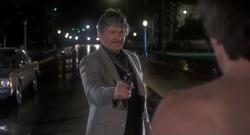
10 to Midnight
1983 -
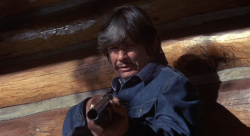
Mr. Majestyk
1974 -
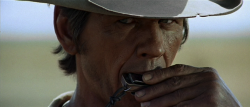
Once Upon a Time in the West
1968 -
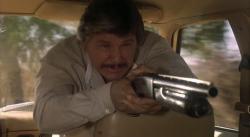
The Evil That Men Do
1984 -

Farewell, Friend
1968 -
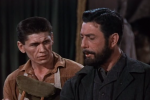
House of Wax
1953
We don’t do comments anymore, but you may contact us here or find us on Twitter or Facebook.



